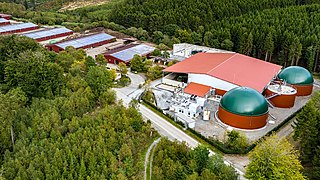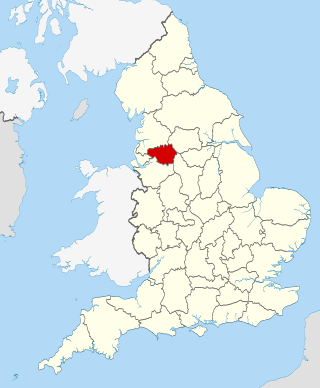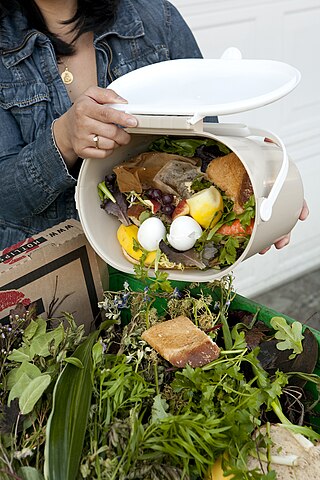Related Research Articles

Biodegradation is the breakdown of organic matter by microorganisms, such as bacteria and fungi. It is generally assumed to be a natural process, which differentiates it from composting. Composting is a human-driven process in which biodegradation occurs under a specific set of circumstances.

Biogas is a gaseous renewable energy source produced from raw materials such as agricultural waste, manure, municipal waste, plant material, sewage, green waste, wastewater, and food waste. Biogas is produced by anaerobic digestion with anaerobic organisms or methanogens inside an anaerobic digester, biodigester or a bioreactor. The gas composition is primarily methane and carbon dioxide and may have small amounts of hydrogen sulfide, moisture and siloxanes. The gases methane and hydrogen can be combusted or oxidized with oxygen. This energy release allows biogas to be used as a fuel; it can be used in fuel cells and for heating purpose, such as in cooking. It can also be used in a gas engine to convert the energy in the gas into electricity and heat.

Waste management or waste disposal includes the processes and actions required to manage waste from its inception to its final disposal. This includes the collection, transport, treatment, and disposal of waste, together with monitoring and regulation of the waste management process and waste-related laws, technologies, and economic mechanisms.
Alternative technology is a term used to refer to technologies that are more environmentally friendly than the functionally equivalent technologies dominant in current practice. The term was coined by Peter Harper, one of the founders of the Centre for Alternative Technology, North Wales, in Undercurrents (magazine) in the 1970s. Alternative Technologies are created to be safer, cleaner, and overall more efficient. The goals of alternative technology are to decrease demand for critical elements by ensuring a secure supply of technology that is environmentally friendly, increased efficiency with lower costs, and with more common materials to avoid potential future materials crises. Alternative technologies use renewable energy sources such as solar power and wind energy. Some alternative technologies have in the past or may in the future become widely adopted, after which they might no longer be considered "alternative." For example, the use of wind turbines to produce electricity.

Anaerobic digestion is a sequence of processes by which microorganisms break down biodegradable material in the absence of oxygen. The process is used for industrial or domestic purposes to manage waste or to produce fuels. Much of the fermentation used industrially to produce food and drink products, as well as home fermentation, uses anaerobic digestion.
Articles related to waste management include:

The Greater Manchester Waste Disposal Authority (GMWDA) was England's largest waste disposal authority, responsible for the management and disposal of municipal waste from Greater Manchester. It dealt with 1.1 million tonnes of waste produced each year, from approximately 1 million households and a population of over 2.27 million in the metropolitan districts of Bolton, Bury, Manchester, Oldham, Rochdale, Salford, Stockport, Tameside and Trafford — though part of Greater Manchester, the Metropolitan Borough of Wigan administers its own waste disposal operations, however they were represented on the authority for administration purposes. The waste came primarily from household waste collections and 20 household waste recycling centres (HWRCs) provided and serviced by the GMWDA. It handled around 4% of the nation's municipal waste.
A mechanical biological treatment (MBT) system is a type of waste processing facility that combines a sorting facility with a form of biological treatment such as composting or anaerobic digestion. MBT plants are designed to process mixed household waste as well as commercial and industrial wastes.

Biodegradable waste includes any organic matter in waste which can be broken down into carbon dioxide, water, methane, compost, humus, and simple organic molecules by micro-organisms and other living things by composting, aerobic digestion, anaerobic digestion or similar processes. It mainly includes kitchen waste, ash, soil, dung and other plant matter. In waste management, it also includes some inorganic materials which can be decomposed by bacteria. Such materials include gypsum and its products such as plasterboard and other simple sulfates which can be decomposed by sulfate reducing bacteria to yield hydrogen sulfide in anaerobic land-fill conditions.

Biodegradable plastics are plastics that can be decomposed by the action of living organisms, usually microbes, into water, carbon dioxide, and biomass. Biodegradable plastics are commonly produced with renewable raw materials, micro-organisms, petrochemicals, or combinations of all three.

Food waste in the United Kingdom is a subject of environmental, and socioeconomic concern that has received widespread media coverage and been met with varying responses from government. Since 1915, food waste has been identified as a considerable problem and has been the subject of ongoing media attention, intensifying with the launch of the "Love Food, Hate Waste" campaign in 2007. Food waste has been discussed in newspaper articles, news reports and television programmes, which have increased awareness of it as a public issue. To tackle waste issues, encompassing food waste, the government-funded "Waste & Resources Action Programme" (WRAP) was created in 2000.
Fairfield Materials Management Ltd is a Manchester-based social enterprise that operates a community waste management project at Manchester’s New Smithfield Market focused on minimising waste, and bringing social and environmental benefits to Greater Manchester.

Source-separated organics (SSO) is the system by which waste generators segregate compostable materials from other waste streams at the source for separate collection.
SUEZ Recycling and Recovery UK Ltd, formerly SITA UK Limited, is a British waste management company, established in 1988. It was previously called Sitaclean Technology. It began as a provider of local authority services, with its first municipal services contract in Erewash, Derbyshire in 1989. Suez has expanded its business through a combination of new contracts, joint venture partnerships and acquisitions.
The Anaerobic Digestion and Bioresources Association (ADBA), formerly the Anaerobic Digestion and Biogas Association, is a United Kingdom-based trade association that operates to represent business involved in the anaerobic digestion and biogas sectors.

The Association for Renewable Energy and Clean Technology, previously known as Renewable Energy Association (REA), is a renewable energy and clean technology trade association in the UK encompassing all of renewables industry in the United Kingdom. REA covers renewable power & flexibility, heat and cooling, circular bioresources and transport. The REA is a not-for-profit company.
Iona Capital Ltd is a fund management institution that specializes in the management of equity and debt investments for private and institutional clients. Its investment strategy focuses on seeking out promising start-up companies that align with the UK Government's goal of reducing waste sent to landfills. In addition to its environmental objectives, the company also places a significant emphasis on identifying and partnering with strong management teams.
Biogen (UK) Ltd is a leading UK owner and operator of anaerobic digestion and composting plants based in Bedfordshire. It is responsible for the construction of 22 plants to date and currently operates fourteen anaerobic digestion plants and six composting facilities in England, Scotland and Wales.
References
- ↑ "Organics Recycling Group's terms of reference, aims and objectives". organics-recycling.org.uk. Retrieved 2014-10-02.